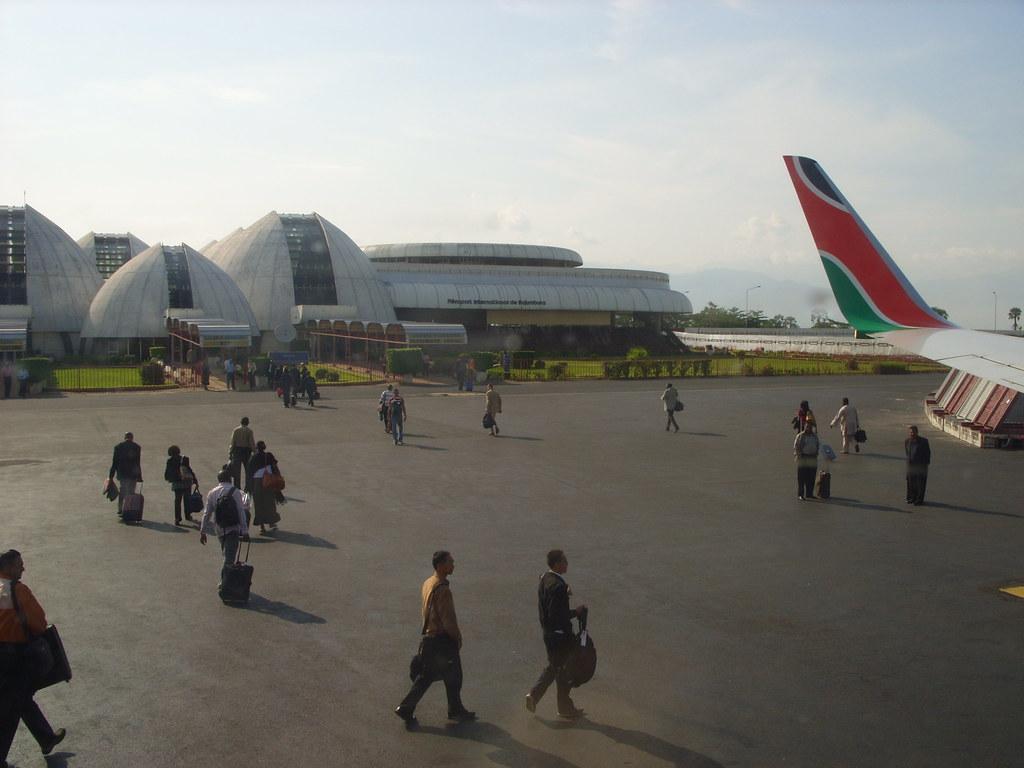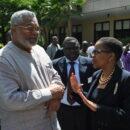Covid-19: Africa must act locally, but keep thinking globally

A danger perhaps graver than the disease itself is the collapse of our economies, mortally wounded by a world turning in on itself.

At Bujumbura airport. Credit: dmitri_66
Read all our COVID-19 coverage
The world faces unprecedented crisis. The full health consequences of the Covid-19 pandemic are yet to be calculated. This is not to say we should diminish the extent of previous catastrophes.
The First World War cost 40 million lives, or 2.5% of the 1914 world population. This trauma was followed, within a generation, by twice the number of deaths in the Second World War, or 4% of the total population in 1939. The Spanish flu epidemic of 1918, the deadliest in history, cost an estimated 50 million deaths, or 3.3% of the population, and infected perhaps ten times this number.
The difference today is both in the rapidity of the spread of Covid-19 – reflecting our changes to technology, trade and transport over the last century – and the media context in which this is occurring.
Despite the dip in global trade caused by WW1, WW2 and the Cold War, world exports as a proportion of GDP are today 40 times larger (in constant values) than in 1913. Meanwhile, the speed of communications today is astounding.
Between 1914 and 1918 some 80 million telegraphic messages passed through the hands of censors. In 2017, people sent 23 billion text messages each day, American students spending on average more than an hour and a half a day texting. Information spreads faster than ever, which means that more people know about the disease and how to reduce its impact. But panic also spreads faster, sometimes accelerated by fake news, making it harder for leaders to stay focused on what must be done to mitigate its effects.
Trade and technology have fundamentally changed the world economy. This is especially important to developing economies, which lifted their share of world exports from one-third of global trade to half in just 30 years from 1980. Integration with world markets richer than their own has been a crucial aspect especially of the Asian development story. As supply chains have developed, world trade has consistently grown nearly twice as fast as production.
A billion people have, as a consequence, been lifted out of poverty in just a single generation.
In this together
Thus, the correct tactical response to Covid-19 has been to isolate and slow the pace of infection. This allows time to build immunity, reduce the stress on public resources, and hopefully to develop a vaccine.
But it is critical that leaders, and their populations, don’t take the wrong long-term message from this. It is important not to double-down on isolation. Don’t use this opportunity to wriggle out of overdue economic reforms.
Herein lies a great danger, perhaps graver than Covid-19 itself: the collapse of our economies, mortally wounded by a world feeding on its fears, turning in on itself to the exclusion of others.
Our citizens are increasingly self-employed, though the balance of reforms is politically tilted towards the public sector. It is crucial that small businesses don’t go under in the short-term, worsening the effects of the disease. Governments have a responsibility to act now to stem what could become a jobs catastrophe as businesses close doors due to dwindling cash flow. Many developing economies, and especially those in Africa, have few resources to enable a soft landing.
It is crucial that the world’s leaders recognise that disease knows no boundaries, that this is not someone else’s problem, somewhere else. And if the longer-term effects of this crisis are to be mitigated, now is the time to focus on how to develop sustainable economic growth and employment.
The correct global response is to make it easier for businesses to invest and hire, to radically reduce tariffs and other barriers to international trade. We must democratise access to technology. We should strengthen multilateral responses. We are all in this together.
Countries that have been more open have generally fared better in development. This is the lesson not only from Asia’s successful export-driven growth model, which has spurred competitiveness to the benefit of domestic consumers. It is also the lesson from countries that have liberalised in terms of fundamental rights, democracy and freedoms.
Openness relates also to a willingness to learn, permit and even encourage external influences. This was the fundamental lesson from Japan throughout the Meiji Restoration, which provided the catalyst for the entire region to develop and prosper. Singapore relied heavily on external advisers and deliberately sought to attract multinational companies that brought with them not only skills, capital and technology but logistics and ready markets.
All politics is local
We might be experiencing a temporary discontinuation of global integration, prompting us to think carefully about the world we live in and how we limit the spread of negative shocks. The virus may have disrupted global supply chains, prompted (temporary) border closures, and led some to question aspects of globalisation. But the crisis demonstrates the limits of isolated national responses; its resolution will demand unprecedented levels of international scientific and other collaboration.
Putting people, not politics, first will ensure the conditions for continued prosperity post-Covid-19.
Tip O’Neill, the former speaker of the US House of Representatives, famously declared following his only electoral defeat in 1935 that “All politics is local”.
Today, despite the temptation to hunker down and isolate, we need to continue to reform and push for openness and competitiveness. We must act locally, but we need to keep thinking globally.
This article is by Olusegun Obasanjo, Ellen Johnson Sirleaf, and Jonathan Oppenheimer on behalf of the board of The Brenthurst Foundation.







Covid-19 may end up a Neutron bomb in reverse. A neutron bomb was designed to maximize lethal neutron radiation in the near blast while minimizing the physical power of the blast itself.
Neutron Bomb:
Kill people. Keep the physical infrastructure standing.
Covid-19 response:
Save the people. Destroy the world economy.
We are living at a time when real war is not viable thus forcing countries to use other measures such as diseases. In this case the covid 19 is the weapon being used to propagate this war. This is what I call globalisation or the new world order after the Berlin wall fell . It is however, a good piece
Romans 5:12 says the following of Adam – “Therefore, just as sin came into the world through one man, and death through sin, and so death spread to all men because all sinned”
As a result, there is no human being who is immune to the power nor the effects of sin, such as disease and sickness.
Therefore death, sickness, disease and all kinds of natural disasters exist because of the existence of sin in humanity and on the earth (Genesis 3:14-19).
Sin itself can be compared to a disease that has been methodically destroying the earth and humanity from the time it entered the world.
Therefore the Coronavirus or any other disease or sickness is a grim reminder that we live in an imperfect and sinful world. Diseases such as the Coronavirus which bring fear and death are consequences of living in a fallen world which is under the curse of sin.
True. But Jehovah our creator, put another plan in action after the disobedience of Adam and Eve. He, Jehovah, has set a time for the end of this increasingly horrible system we live in. He, Jehovah, has also made a way out for OBEDIENT mankind. The Bible has ALL OF THE TRUE ANSWERS we need to meet those requirements. Before this COVID-19 broke out, I could invite you to attend a meeting at the local Kingdom, but we are not gathering due to this virus. But what I am going to do is invite you to log on to jw.org. There you will be able to download any literature you want FREE!! This is the first time in over 100 years that Jehovah’s Witnesses are not walking up to your doors 2 by 2. Just like Jesus sent out his disciples to preach among the nations. So around the world, publishers In over 120,000 congregations are busy writing letters, telephone witnessing and like me, on the internet spreading the same message that Jesus gave to his disciples. And that is about the Kingdom of God. Matthew 6:9-15. Take care, Kate
The disease is forcing us to be inhuman avoid contact, put mask to cover face. We should go within and ask ourselves where did we go wrong as human beings. We also need to remember that we are bigger and stronger than the virus. It is not by might nor by sword that we will overcome, but it through the power of God. This is a lesson to the human race how we treat each other. Love conquers all, and from Love and Light we were born.
Jesus is the answer, just accept Jesus as your personal savoir and you will be saved, go to heaven and avoid hell
Covid19 has come to us ( human) as a lessons that , we have crossed the bounadry of humanity and indulged in a lot of sins in the name of modernity and so called developments permitted to us by the so called modern democracy. The world has sinned and still sinning, and we all knew it and pretend / ignore, and now we are paying for it. The aftermath of Covit 19 will be disastrous on the economies of the world especially the developing countries / countries that refused to developed and always depends on other countries to assist them in everything. I hope we are learning and to translate what we have learnt into practice for the betterment of human race.